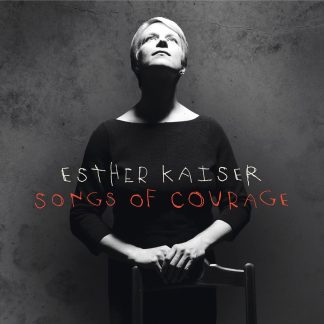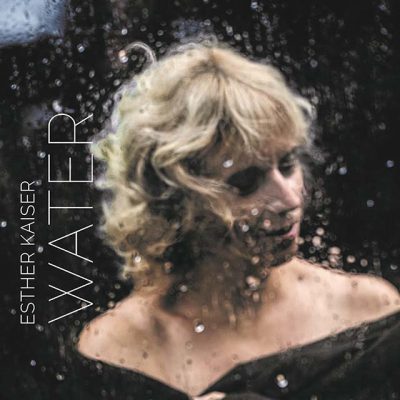Description
Esther Kaiser – voc/ synth/ glasharp/ glockenspiel
Tino Derado – piano/ accordion
Marc Muellbauer – doublebass
Roland Schneider – drums
Featured Guests:
Marie Gitman – oboe/ englishhorn
Sebastian Studnitzky – trumpet
Die Nixen* – string quartet
* Rahel Rilling-violin1, Katharina Wildhagen-violin2, Kristina Menzel-Labitzke-viola, Nicola Springler-cello
„Water is the origin of all things. It´s the substance from which everything emerges and to which all things will return. – Thales of Miletus
„If jazz has to be termed as a wave, then music is a sea, but if the reflectors in the water is the chord.“ – PAT METHENY
The vocal artist and jazz vocalist Esther Kaiser has taken on a theme for her new album that – as with the widely praised previous album “Songs of Courage” – addresses an important aspect of our time, which is constantly in flux, in which nothing is more constant than the liquid, than the evaporation and liquefaction of everything solid and traditional: Water.
Esther Kaiser therefore takes the ancient and, from today’s perspective, of course not to be taken literally, quote from Thales of Miletus as a poetic-metaphorical image for her album:
“Water is the origin of all things. It´s the substance from which everything emerges and to which all things will return.“
Thus, even the musically and lyrically multifaceted theme of the album repeatedly finds its way back to pure clarity and lightness, despite the shimmering socio-political and climate-related dimension that Kaiser does not disregard in her cleverly nuanced approach.
On this album, Kaiser transports listeners to a sound that is at once contemporary and urban, as well as to enraptured, almost fairy-like worlds of sound, thanks to the use of unusual sound sources such as the water-powered glass harp and extremely exciting musical guests such as Marie-Christine Gitman on oboe and English horn, the Berlin string quartet “Die Nixen” and the renowned trumpeter and multi-instrumentalist Sebastian Studnitzky.
The genesis of the album fits perfectly with the ancestral symbolism of water, which in many cultures is considered a threshold between (dream) worlds.
“In the first Corona lockdown and during a prolonged period of drought in the spring of 2020, during which I had also read the book „The end of the ocean” by Norwegian author Maja Lunde, the song “Water” was created practically in my sleep,” says Esther Kaiser about her first initial inspiration for the new album, which could be described as no dream log. And adds:
“I dreamed the melody and the complete lyrics of the chorus and wrote the idea down immediately after waking up. Very quickly, almost as if following a dream dictation, I then finished writing the piece. It was quickly joined by other compositions and lyrics, almost all of which were penned by me and my long-time musical companions Tino Derado and Marc Muellbauer. They’re not all explicitly about water, but on a more abstract level there are images, associations and analogies that connect the songs to the common theme.”
In “Lament of the King’s Wife” for example, it is the tears of the outcast queen that connect to the theme of “water.” She lost – according to the old Bosnian ballad “Hasanaginica” from the 17th century – her marriage and her five children because she did not visit her wounded husband on the battlefield. Esther Kaiser wondered about the reason of her non-appearance at her husband’s sickbed and in her lyrics to Tino Derado’s composition she created a prequel that introduces the actual story that has been handed down. By the way, the German adaptation of the ballad was written by none other than Johann Wolfgang von Goethe, who gave it the title “Klaggesang von der edlen Frau des Asan Aga”.
The “Ocean’s Song” takes up the image of the ocean as the primordial ground of life, into which one sinks again at the end to finally become completely one with it. However, not without first asking oneself once again what one has actually done with the given time of life.
Time always plays a prominent role in Kaiser’s lyrics anyway – its passing, flowing and evaporating:
“Time’s a river” is an invitation to “live in the moment” and to let go, according to the haunting and mantra-like repeated “Let go” at the end of the piece, like “The Ocean’s Song” also a dreamlike composition by Tino Derado.
“The Red Sea,” a darkly spherical ballad by Esther Kaiser that lay in a drawer for nearly 20 years before being brought back to life for this album, tells of the grief and inner loss of someone about to commit a horrific act of violence – a “red sea.” “For many years I didn’t dare to let this song get to me and to the audience, also because it’s a fine line when you try to put yourself in such a person’s shoes. Nevertheless, we are dealing with a human being in spite of everything. A person who has a history, who was once a child, who had hopes and dreams. The idea that perhaps a small, bright moment, a tender touch or a look from another person could once again prevent this person from committing terror and violence, that interested and touched me while writing the text.”
Nevertheless, Esther Kaiser has a feeling for melancholic moments, but always manages to keep a lightness in her music.
„Duna”, a piece by Esther Kaiser that begins with the warm sounds of the English horn, is about farewell and loss. The word “Duna”, partly also handed down as “danu” means “river” or “liquid” in Indo-Germanic. Names of large rivers such as the Danube and the Don are derived from this word.
The worldwide drinking water situation drives Esther Kaiser in many of her songs: “Salty River” has a central meaning here and is represented in two different versions on the album. The first version (track 5) lives from a sparse instrumentation in a duo with Tino Derado on accordion and Esther Kaiser on synthesizer and glockenspiel. Kaiser’s text has a double meaning: once, in a literal sense, it is about the salinization of a former freshwater river. In the metaphorical sense, it is simultaneously about a river of tears. “As already mentioned, the book „The end of the ocean” by Maja Lunde touched and affected me deeply. The song “Salty River” was probably born from an inner image that arose in me while reading the book. I am especially happy to have the piece again in the form of an epilogue in a very special instrumentation at the end of the album: With the string quartet „Die Nixen“ („The Mermaids“) in an arrangement by my longtime friend and brother-in-law Sven Klammer and with the wonderful Sebastian Studnitzky on trumpet” tells the singer.
“I’m very happy at all about my musical guests on this album,” says the singer. “It literally “fell into place” in the course of the album production that I met the “Nixen” during a joint concert project under the direction of Sven Klammer in the spring of 2021; also the oboist Marie-Christine Gitman came into my life during a joint production at the end of 2020 and I knew immediately that she was the right one for my piece “The Red Sea”, which I had imagined from the beginning with oboe. And I’ve wanted to do something together with Sebastian Studnitzky for a long time; I wanted exactly his sound and musical sense for the title track “Water” and the epilogue “Salty River” – his distinctive timbre practically forms the framework of the album.”
Another striking sound feature of “Water” is the spherical, almost supernatural-sounding glass harp, played by Esther Kaiser herself.
“If you ask me now how it came about and whether I had planned it that way for the album from the beginning, I can only say: no, it was a relatively spontaneous but all the more compelling idea I had after we were already in the studio as a band… One day I was researching the topic of “water-powered instruments” and suddenly found it absolutely compelling to experiment with it on the record as well. So to take up the theme of “water” also in the sound, of course also in the awareness that this can easily slide into the kitschy or esoteric” Esther Kaiser continues. “I hope we haven’t crossed that fine line,” she laughs.
“I just wanted to experiment a lot with new sounds on this album; I play my composition “The Sailor” as a solo piece with synthesizer and vocal sound effects live just as I recorded it for the album. This is a wonderful challenge for me and a great feeling of musical “self-efficacy.”
As on her previous album, “Songs of Courage,” Kaiser’s lyrics repeatedly include political statements and sometimes sharp-tongued comments, but she never exempts herself from the criticism expressed.
In “Don’t we know better”, the song that Marc Muellbauer contributed to the album, you can literally see the populist, self-satisfied state leaders that Kaiser addresses, who treat beauty and nature insensitively and disrespectfully and only have their own profit in mind. At the same time, the self-critical question is asked “Would we do better – better than they do?” – “Would we ourselves really do better?” In Esther Kaiser’s work, socio-political criticism and self-reflection always go hand in hand. It is therefore only consistent that the interlude before Muellbauer’s composition, freely improvised by bass and drums, with its title “Die Flut” (The Flood) refers to the current flood disaster of 2021 in Germany.
Between the songs of the album there are always short so-called “interludes”, many of them freely improvised at the moment of recording; some of them, like the miniature song by Esther Kaiser titled “Raindance”, recorded solo with loops and kalimba, almost a kind of multi-layered, organized sound installation. In different ways, all of the Interludes have something to do with water in a literal or metaphorical sense. Thus, the titles of these musical miniatures also repeatedly point to the theme of the album, such as “Vesi” or “Maji”: in Finnish and in Swahili, this means „water”.






Reviews
There are no reviews yet.